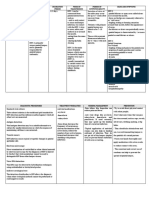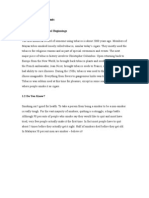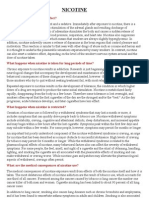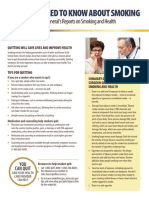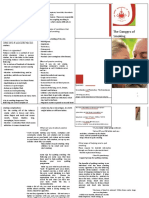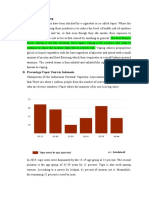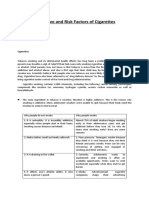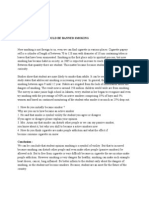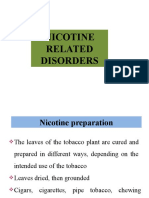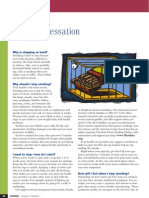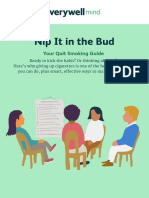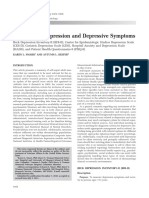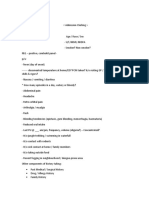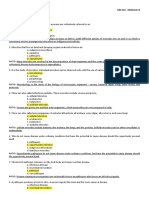Why Do I Smoke PDF
Why Do I Smoke PDF
Uploaded by
maricelCopyright:
Available Formats
Why Do I Smoke PDF
Why Do I Smoke PDF
Uploaded by
maricelOriginal Title
Copyright
Available Formats
Share this document
Did you find this document useful?
Is this content inappropriate?
Copyright:
Available Formats
Why Do I Smoke PDF
Why Do I Smoke PDF
Uploaded by
maricelCopyright:
Available Formats
American Thoracic Society
PATIENT EDUCATION | INFORMATION SERIES
Why Do I Smoke and Why Do I Keep Smoking?
Most people who smoke tobacco start during their teenage years
or as a young adult. There are many reasons why a person starts to
smoke. For some teens, it is a way to rebel against their parents.
oking
NING: Sm
Other teens may feel pressure from their friends (peer pressure) N GENER
AL’S WAR t Disease,
ar
SURGEO Lung Cancer, He ate Pregnancy
Causes mplic
d May Co
and begin smoking as a way to appear “cool”. Some may be Emphys
ema, an
modeling a parent’s or sibling’s behavior, and others believe it is a
way to relieve stress or boredom. Even if you don’t think you are
going to keep smoking, it is very easy to get “hooked” or
addicted because of the nicotine found in all tobacco products.
Being dependent on (addicted to) the nicotine means time and increases his or her attention and focus.
that you need to keep getting nicotine. Your body Many smokers report that they enjoy the ritual of
depends on it to feel comfortable and you will have smoking. They also say that smoking gives them a
uncomfortable symptoms if you don’t get enough of it or pleasurable feeling. Smoking relieves their nicotine
often enough. When you don’t get enough nicotine you withdrawal symptoms.
will have symptoms of withdrawal.
Shortly after smoking their last cigarette, smokers start
Addiction to the nicotine in tobacco can happen very to feel a negative mood change. This “withdrawal” from
CLIP AND COPY
quickly, even after only smoking for a short time or the chemical nicotine makes the smoker uncomfortable.
smoking only a few cigarettes. The good news is that you Many smokers report feeling anxious, irritable and
can overcome addiction to nicotine. Knowing more about restless when they stop smoking. This is because they
the science behind nicotine addiction may make it easier are not getting what the brain feels it needs to work well.
for you to take steps to becoming tobacco-free. Smokers usually experience relief from these unpleasant
The simple facts: feelings as soon as they smoke again, use other
Nicotine is a chemical that is present in all forms of tobacco. tobacco products, or nicotine replacement medications
Nicotine is also found in electronic cigarettes and the liquid (additional information on these topics about nicotine
used in ENDS (electronic nicotine delivery systems). and tobacco is available at www.thoracic.org/patients ).
Nicotine is highly addictive. When a person uses tobacco, Symptoms of Nicotine ■■ Irritability, frustration, anger
either by smoking cigarettes, using chewing tobacco or Withdrawal ■■ Increased appetite
by using another form of tobacco, nicotine enters the ■■ Tremors
body and activates nicotine receptors in the brain. ■■ Depression
The faster the delivery of nicotine to your body, the ■■ Insomnia
greater the addictive effect on the brain. Cigarettes have ■■ Anxiety
been designed to give high levels of nicotine to the brain
very quickly. ■■ Difficulty concentrating
■■ Difficulty feeling pleasure
When you smoke a cigarette it only takes six to ten
seconds for the nicotine to reach your brain. This makes The Power of Nicotine Addiction
smoking tobacco very addictive and difficult to stop. Physical addiction to nicotine is not the same for
Nicotine that is inhaled in cigarette smoke is absorbed everyone. Some people may experience mild addiction.
by the lungs into the bloodstream and quickly goes to Others can rapidly progress to severe addiction. When a
the heart and brain. The brain reacts to the nicotine by person experiences a strong urge to smoke that is difficult
releasing chemicals that imitate the same effects on a to ignore, it is called a craving.
person’s mood as amphetamines (“speed”) and cocaine. Healthcare providers can use a scale to rate your level
Nicotine is a stimulant that speeds up a person’s reaction of addiction to nicotine (see the Fagerstrom Test for
Am J Respir Crit Care Med Vol. 196 , P7-P8, 2017
ATS Patient Education Series © 2017 American Thoracic Society
www.thoracic.org
American Thoracic Society
PATIENT EDUCATION | INFORMATION SERIES
Nicotine Dependence). Based on your answers to this Aside from the physical addiction, many regular smokers
test your level of addiction can be described as severely report that smoking is part of their everyday routine. A
dependent, moderately dependent, or minimally person needs to make changes in their normal routine
dependent. People who smoke within 30 minutes of and that can be hard. But you can be successful. Think
waking are usually more severely addicted to nicotine about when you smoke and what you are doing when you
than others. smoke. Try to do things differently or do things that don’t
Fagerstrom Test for Nicotine Dependence1 remind you of smoking. For example, if you always smoke
after a meal, try doing something else like clearing and
How soon after you wake a. Within 5 minutes 3 Points
washing the dishes or taking a walk.
up do you smoke your first
b. Within 6-30 2 Points It is best to talk to your healthcare provider about the
cigarette?
minutes.
safest and most effective ways to stop using tobacco
c. Within 31-60 1 Points and all nicotine containing products. Your healthcare
minutes provider can help you choose a treatment plan that may
d. After 60 minutes 0 Points
include medication, nicotine replacement products, and
counseling to help keep you comfortable throughout the
Do you find it difficult to a. Yes 1 Point process of stopping smoking.
refrain from smoking in
places where it is forbidden Authors: Patricia Folan, RN, DNP, CTTS, Andrea Spatarella, DNP,RN,
(e.g., in church, at the b. No 0 Points FNP-BC, Daniel Jacobsen, MS NP-C, Harold J. Farber, MD, MSPH
Reviewers: Marianna Sockrider MD, DrPH
library, in cinema, etc)?
Which cigarette would you
hate most to give up?
a. The first one in
the morning
1 Point
R Action Steps
b. Any other 0 Points ✔✔ Make a list of the risks of continued smoking and the rewards of
quitting for you.
How many cigarettes per a. 10 or less 0 Points ✔✔ Pay attention to your smoking pattern and whether you crave
day do you smoke? nicotine or have symptoms of withdrawal from nicotine.
b. 11-20 1 Point ✔✔ Talk to your health care provider about the most effective ways
to manage your nicotine addiction.
✔✔ Set a goal date to stop smoking and stick to that date.
c. 21-30 2 Points ✔✔ Ask others to help support your efforts to quit using tobacco.
d. 31 or more 3 Points ✔✔ For additional help in quitting, join a local quit smoking
Do you smoke more during a. Yes 1 Point support group or call toll-free 1-800-QUIT-NOW in the US or
1-866-366-3667 in Canada).
the first hours after waking
than during the rest of the b. No 2 Points Healthcare Provider’s Contact Number:
day?
Do you smoke even when a. Yes 1 Point
you are ill enough to be in
bed most of the day? b. No 2 Points Additional Resources:
National Cancer Institute
Now add up your points. How did you score? ________ Points BeTobaccoFree.gov
A score of 5 or more indicates a significant dependence, while a score
Easy to use information about smoking and how to stop.
of 4 or less shows a low to moderate dependence
https://betobaccofree.hhs.gov
1 http://cde.drugabuse.gov/instrument/d7c0b0f5-b865-e4de-e040-bb89ad43202b
American Lung Association
http://www.lung.org/stop-smoking/
Even with the best intentions, people who have moderate
Public Health England
or severe nicotine addiction will have difficulty stopping
https://www.nhs.uk/smokefree
tobacco use without help. A person who is nicotine
U.S. Department of Health and Human Services. How Tobacco
dependent will usually need medical help and support Smoke Causes Disease: The Biology and Behavioral Basis for Smoking-
in order to stop tobacco use and stay quit. There are Attributable Disease: A Report of the Surgeon General Atlanta, GA:
medications that can help reduce symptoms of nicotine U.S. Department of Health and Human Services, Centers for Disease
withdrawal and increase comfort while trying to stop Control and Prevention, National Center for Chronic Disease Prevention
and Health Promotion, Office on Smoking and Health, 2010.
smoking. Switching to “light” cigarettes or to e-cigarettes http://neuroscience.mssm.edu/nestler/brainRewardpathways.html
does not usually lead to quitting. (For more information
on quitting smoking see the ATS Patient Information This information is a public service of the American Thoracic Society.
The content is for educational purposes only. It should not be used as a
Series at www.thoracic.org/patients). substitute for the medical advice of one’s health care provider.
www.thoracic.org
You might also like
- PIC - NIC AnalysisDocument14 pagesPIC - NIC AnalysistecnicaseplNo ratings yet
- Periodisation TemplateDocument1 pagePeriodisation TemplateCarla BaraybarNo ratings yet
- Persuasive Speech OutlineDocument3 pagesPersuasive Speech OutlineJordan Johnson0% (1)
- Smoking Cessation PamphletDocument2 pagesSmoking Cessation PamphletjeromeNo ratings yet
- Herpes Simplex: Etilogic Agent Incubation Period Mode of Transmission Period of Communicability Signs and SymptomsDocument2 pagesHerpes Simplex: Etilogic Agent Incubation Period Mode of Transmission Period of Communicability Signs and SymptomskyawNo ratings yet
- 7 Types of ADHD PDFDocument3 pages7 Types of ADHD PDFAamir Malik67% (3)
- Macrocytic AnemiasDocument28 pagesMacrocytic AnemiasDeepankar SrigyanNo ratings yet
- Williams Study Guide Maternal PhysiologyDocument7 pagesWilliams Study Guide Maternal PhysiologyCarl Vin PasionNo ratings yet
- Myths About QuittingDocument2 pagesMyths About QuittingSharique KhanNo ratings yet
- NIDA MindMatters 508 Nicotine 2022Document5 pagesNIDA MindMatters 508 Nicotine 2022shr3d3rNo ratings yet
- BSN 104 - Group 1 Smoking and Vaping Cessation CampaignDocument34 pagesBSN 104 - Group 1 Smoking and Vaping Cessation CampaignCedric KelvinNo ratings yet
- BTIS Principle Power PointDocument66 pagesBTIS Principle Power Pointmary grace banaNo ratings yet
- Blue and White Modern Business Agency Trifold BrochureDocument2 pagesBlue and White Modern Business Agency Trifold Brochuredana FAHAdNo ratings yet
- NiciDocument2 pagesNicimjekesiapergjithshmeNo ratings yet
- All About VapingREALDocument8 pagesAll About VapingREALKatherine CroweNo ratings yet
- Does Hypnosis Works To Quit SmokingDocument8 pagesDoes Hypnosis Works To Quit SmokingOlek AndrewNo ratings yet
- Dyk TobaccoDocument5 pagesDyk TobaccoKicki AnderssonNo ratings yet
- Hypnotherapy For Quitting SmokingDocument7 pagesHypnotherapy For Quitting Smokingselfhypnosisuk100% (1)
- Cigarettes and HealthDocument1 pageCigarettes and Health9fpmxg4fzvNo ratings yet
- Is Actually Harmful???: VapingDocument2 pagesIs Actually Harmful???: VapingNuma ChowdhuryNo ratings yet
- How To Stop SmokingDocument48 pagesHow To Stop SmokingAditya KumarNo ratings yet
- Why Vaping Is BadDocument2 pagesWhy Vaping Is Badedm.amill3rNo ratings yet
- Nicotine Addiction Handbook: Signs, Symptoms, Effects & TreatmentsFrom EverandNicotine Addiction Handbook: Signs, Symptoms, Effects & TreatmentsNo ratings yet
- Alcohol Drinking and Cigarette SmokingDocument3 pagesAlcohol Drinking and Cigarette SmokingFrancis FloresNo ratings yet
- Acknowledgements: 1.1 Tobacco's Historical BeginningsDocument10 pagesAcknowledgements: 1.1 Tobacco's Historical BeginningsAlvinFernandezNo ratings yet
- Q4 Health LESSON 1Document29 pagesQ4 Health LESSON 1Ariannadianne ReyesNo ratings yet
- Who FCTC and Mpower Strategy Module ODocument27 pagesWho FCTC and Mpower Strategy Module Oeijneb nasihubNo ratings yet
- Dep Ed DEMOPPTDocument53 pagesDep Ed DEMOPPTAlexis Mae Dayondon CabilisNo ratings yet
- Theoretical Framework - Negative Effect of SmokingDocument1 pageTheoretical Framework - Negative Effect of SmokingStevezkie Onii-chanNo ratings yet
- The Brain's Response To NicotineDocument3 pagesThe Brain's Response To NicotineFurkan Berk KayaNo ratings yet
- Nicotine: How Does Nicotine Deliver Its Effect?Document6 pagesNicotine: How Does Nicotine Deliver Its Effect?jmolaecheaNo ratings yet
- Vaping Presentation ScriptDocument4 pagesVaping Presentation Scriptlizzy_lee23No ratings yet
- Cigarette SmokingDocument5 pagesCigarette SmokingImam TofiqurNo ratings yet
- 8 Cigarette Smoking (Health)Document52 pages8 Cigarette Smoking (Health)Jecjec TayaoNo ratings yet
- Managing CravingsDocument20 pagesManaging CravingsAnonymous 9dVZCnTXSNo ratings yet
- Biology ProjectDocument12 pagesBiology Projectvvdgkyezyi100% (1)
- Vaping & E-Cigarettes ActivityDocument2 pagesVaping & E-Cigarettes ActivityStephanie LopezNo ratings yet
- What You Need To Know About Smoking: Advice From Surgeon General's Reports On Smoking and HealthDocument2 pagesWhat You Need To Know About Smoking: Advice From Surgeon General's Reports On Smoking and HealthShivesh LallNo ratings yet
- Tanski Koop 2019 For Posting SmallDocument41 pagesTanski Koop 2019 For Posting SmallFake StreamNo ratings yet
- PeardraftDocument5 pagesPeardraftapi-208850397No ratings yet
- q4 Health Self Learning Module SmokingDocument67 pagesq4 Health Self Learning Module SmokingAaronNo ratings yet
- Clearing The Air PDFDocument44 pagesClearing The Air PDFhelfiNo ratings yet
- POT Lesson PlanDocument4 pagesPOT Lesson PlanMichelle ThereseNo ratings yet
- The Dangers of SmokingDocument3 pagesThe Dangers of SmokingGamingWithCactus ReactesNo ratings yet
- What Is VapeDocument5 pagesWhat Is Vapekarliyn marpaungNo ratings yet
- Introduction To NicotineDocument18 pagesIntroduction To NicotineEunice CuñadaNo ratings yet
- Counselor News - Dec 2023 - EngDocument3 pagesCounselor News - Dec 2023 - Engapi-564157608No ratings yet
- Emily White - Stop VapingDocument1 pageEmily White - Stop Vapingapi-491868996No ratings yet
- Protective and Risk Factors of CigarettesDocument6 pagesProtective and Risk Factors of Cigarettesfriendell ariasNo ratings yet
- SmokingDocument18 pagesSmokingJedidiah De LeonNo ratings yet
- Discussion TextDocument5 pagesDiscussion TextRy EoNo ratings yet
- AcknowledgementDocument14 pagesAcknowledgementamNo ratings yet
- Quick TipsDocument1 pageQuick Tipsabdulgaffarbhutto128No ratings yet
- Tips Nicotine and NRT TranscriptDocument2 pagesTips Nicotine and NRT Transcriptsausangtab0899No ratings yet
- Term PaperDocument12 pagesTerm PaperjhoeilheenedyNo ratings yet
- Causes and Problems Resulting Teenage SmokingDocument2 pagesCauses and Problems Resulting Teenage SmokingmaryamNo ratings yet
- Nicotine Related DisordersDocument74 pagesNicotine Related DisordersKuldeep singhNo ratings yet
- 16.2 Health BookDocument4 pages16.2 Health Book252950No ratings yet
- Smoking and HealthDocument13 pagesSmoking and HealthTricia Mae TuazonNo ratings yet
- ,tabac SilicosisDocument46 pages,tabac SilicosismaitealtuNo ratings yet
- Smoking CessationDocument2 pagesSmoking Cessationseanne_mayNo ratings yet
- English ProjectDocument16 pagesEnglish Projectapi-3763677No ratings yet
- Nip It in The Bud: Your Quit Smoking GuideDocument9 pagesNip It in The Bud: Your Quit Smoking Guideshalabh70415No ratings yet
- Maricel I. Hinadac: Medical Health RecordDocument1 pageMaricel I. Hinadac: Medical Health RecordmaricelNo ratings yet
- Lesson Plan FormatDocument7 pagesLesson Plan FormatmaricelNo ratings yet
- Banghay Kabanata 7 Suyuan Sa AsoteaDocument2 pagesBanghay Kabanata 7 Suyuan Sa AsoteamaricelNo ratings yet
- ALCOHOLDocument1 pageALCOHOLmaricelNo ratings yet
- Crayons Template 16x9Document5 pagesCrayons Template 16x9maricelNo ratings yet
- Summative TestDocument2 pagesSummative TestmaricelNo ratings yet
- Types of Infectious DiseasesDocument11 pagesTypes of Infectious DiseasesmaricelNo ratings yet
- Ritmo Diyalogo Aktor Iskrip Tanghalan Aktor Mahika Sukat Manonood Hayop Talinhaga Katwiran TugmaDocument17 pagesRitmo Diyalogo Aktor Iskrip Tanghalan Aktor Mahika Sukat Manonood Hayop Talinhaga Katwiran TugmamaricelNo ratings yet
- Syllabus On HypertensionDocument9 pagesSyllabus On HypertensionNiña Antoniette GutangNo ratings yet
- Knowledge, Attitude and Practice Towards COVID-19 Among Chronic Disease Patients at Addis Zemen Hospital, Northwest EthiopiaDocument12 pagesKnowledge, Attitude and Practice Towards COVID-19 Among Chronic Disease Patients at Addis Zemen Hospital, Northwest EthiopiaIngrid KoutioNo ratings yet
- About Beck Depression Scale IIDocument13 pagesAbout Beck Depression Scale IIunjudyNo ratings yet
- BDS Fifth Year & Final Prof. NewDocument4 pagesBDS Fifth Year & Final Prof. NewSumeet SodhiNo ratings yet
- Report 526ba 1708255854387Document11 pagesReport 526ba 1708255854387sarbjeetwalia19No ratings yet
- Julius Whittier LawsuitDocument28 pagesJulius Whittier LawsuitkxanwebteamNo ratings yet
- Mock Exam 4 - 25 MCQsDocument3 pagesMock Exam 4 - 25 MCQsAmin AzadNo ratings yet
- Beckman Coulter Manual ProcDocument14 pagesBeckman Coulter Manual ProcWihadi Santoso Indra SusenoNo ratings yet
- Fasting Fasting Cheat SheetDocument1 pageFasting Fasting Cheat SheetBeckyNo ratings yet
- Conective Issue Massage PDFDocument3 pagesConective Issue Massage PDFSergio Andres ZeitgeistNo ratings yet
- Hospital Acquired InfectionsDocument51 pagesHospital Acquired Infectionstummalapalli venkateswara raoNo ratings yet
- Management of Head TraumaDocument15 pagesManagement of Head TraumaBetrice KotanNo ratings yet
- Surgeons and AnesthesiaDocument263 pagesSurgeons and AnesthesiaLuis A De la CubaNo ratings yet
- Cardiovascular SystemDocument41 pagesCardiovascular Systemmoneer chanceNo ratings yet
- MTT 13 (1) 7-2017Document599 pagesMTT 13 (1) 7-2017Carlos CostaNo ratings yet
- Dementia AssignmentDocument19 pagesDementia AssignmentVandna Vikram Novlani50% (2)
- Raditya Mirza Tofani Pembimbing: Prof. DR - Dr. Muh. Ramli Ahmad, SP - An-KMN-KAPDocument35 pagesRaditya Mirza Tofani Pembimbing: Prof. DR - Dr. Muh. Ramli Ahmad, SP - An-KMN-KAPRaditya Indah TofaniNo ratings yet
- Drug Classification of AmlodepineDocument5 pagesDrug Classification of Amlodepineshai raNo ratings yet
- Dengue CaseDocument4 pagesDengue CaseHo Yong WaiNo ratings yet
- DR Flings NotesDocument8 pagesDR Flings NotesSutanu SarkarNo ratings yet
- Child Health Nursing Question Paper 1 Term ExamDocument2 pagesChild Health Nursing Question Paper 1 Term ExamSaima ParveenNo ratings yet
- Testing Effectiveness of Types of ToothpasteDocument2 pagesTesting Effectiveness of Types of Toothpastesophia CaiNo ratings yet
- EXSA - Gold Award Recipients 2009Document1 pageEXSA - Gold Award Recipients 2009applebarrelNo ratings yet
- HES 032 - SAS 1 - Merged-1Document1 pageHES 032 - SAS 1 - Merged-1bangtanswifue -No ratings yet
- Abortion (Miscarrage)Document46 pagesAbortion (Miscarrage)escalatorNo ratings yet




